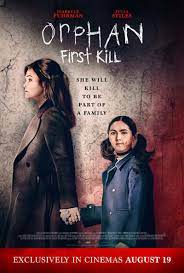
ORPHAN: FIRST KILL
US, 2022, 99 minutes, Colour.
Isabelle Fuhrman, Julia Stiles, Rossif Sutherland, Hiro Kanagawa, Matthew Finlan.
Directed by William Brent Bell.
Back in 2009, critics and audiences were very praising of a kind of psychological thriller, touches of horror, focusing on a mysterious young orphan, Esther, her being taken into a family, made part of the family, but with some psychotic consequences. The film had a strong cast with Vera Farmiga and Peter Sarsgaard as the parents. But, it was a very young Isabelle Fuhrman, as Esther, who made a powerful impression. Sympathetic, repellent, puzzling.
And, 13 years later, producers have had the idea to create a prequel. Who was Esther originally? What was her background? Why was she as she was with the family?
Interesting idea, of course. But, always a challenge to persuade the fans that they should watch a prequel or that it could be possibly as good as the original. (And, of course, there were mixed verdicts, and, it would seem as always, the fans opting for the original and downplaying the prequel.) And, all the plot details not to be taken literally or realistically.
To appreciate the plot of this film will depend on how much of the original we actually remember. But, on checking again with reviews and synopses, it would seem that the writers of this film have simply taken over the plot of the original, the basic plot, but providing some intriguing variations.
In fact, Esther is really Leena, living in an Institute in Estonia, violent and a menace, needing to be controlled, but having quite an artistic talent. And, with using Isabelle Fuhrman again as Esther/Leena, they have to get around the fact that the actress was 30 at the time of filming, turning her into a childlike appearance of the dwarfed older woman, able to turn on the childish charm at a moment’s notice.
A bit complicated, Leena making her way to Moscow, having a book which gives information about a family who have lost their little daughter, Esther, some years earlier, which enables her to concoct a plan, claiming to be the long lost daughter.
We are introduced to the family back in Darien, Connecticut, at a fencing match where a teenage son conquers his opponent, to the praise of his mother (an interesting return to the screen for Julia Stiles) and a distracted father, still overcome by the loss of his daughter (Rossif Sutherland).
So, the new Esther now arrives, playing to the family, playing to the gallery, seemingly charming, suspected by a counsellor but then winning her over, but antagonistic towards the older brother. The mother is very happy, displaying her recovered daughter. And the father, an artist, begins to come to life with joy in the company of his daughter. Isabelle Fuhrman’s appearance and manner is very like that of the British actress, Shirley Henderson.
So far, so happy. But, compliments to the screenwriters in introducing quite an unexpected twist and the rest of the film playing on the twist, bringing touches of violence and horror, more than we might have anticipated.
If we accept the original film, why not accept this variation on the theme?
- The popularity of the original? The performance by Isabelle Fuhrman?
- A prequel, 13 years after the original? With the central character? Giving her a back story? And the new plot with basic similarities with the former plot?
- Establishing the atmosphere, the Institute in Estonia, the winter, the dark, the art teacher arriving, sinister aspects, the security, the doctor, nurses? The alarm? The teacher locked in the room with Leena, her art? Getting out? The apologies of the doctor, the teacher not wanting to stay, her car, Leena appearing at the car, her death?
- Leena, her violence, the book, the story of the family in America? Her going to Moscow, her claiming to be Esther, family, her being repatriated to the US?
- The introduction to the American family, the fencing championship, Gunnar, relentless, winning, his mother’s admiration, his father distracted? The later use of fencing in the drama?
- Esther, 30-year-old, yet in the form of a girl, her look, height, voice? Her creating a character? Understanding the family and their needs, responding to these? In the house, her room? The meals? The bond with her mother? The greater emotional bonding with her father? The antagonism towards Gunnar?
- Life in the household, the father welcoming Esther to the studio, the painting? Tricia observing, bonding with Esther, to the shops? The details in the household? The interlude with the therapist, the therapist’s uncertainty, Esther playing to the gallery, knowledge and details, the therapist’s supporting her?
- The twist, Gunnar and his antagonism, arguments with Esther? The revelation of the story of Esther’s death, Gunnar killing her, the clash, his mother’s support, transporting the body and throwing it down the well?
- The unmasking of Tricia, observing Esther, keeping up appearances, talking with Gunnar, biding her time?
- Esther, shrewd, turning against Gunnar and Tricia? The fights? The pursuits? Tricia deciding it was time?
- The father, his trip, the phone call, his return?
- Esther, trapping Gunnar, the arrow, killing him?
- Tricia and the pursuit, up the stairs, the room, onto the roof, hanging on the roof, Tricia’s fall? The father, his grief, attempt to save Esther, his death?
- Esther, her fate?